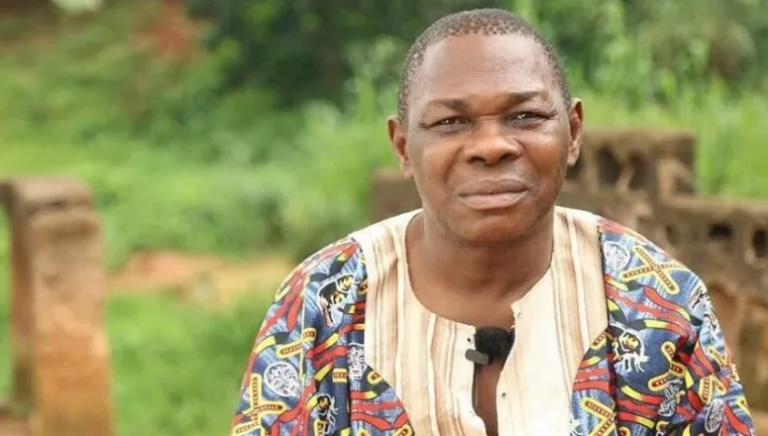Yaoundé, Cameroon – In a stark and unsettling warning, Cameroonian economist and political analyst Dieudonné Essomba has predicted a “bloody transition” as the country nears a pivotal moment in its political landscape. With President Paul Biya’s prolonged rule at 42 years and now aged 92, discussions about the nation’s future leadership have become increasingly tense. Essomba, known for his candid assessments of Cameroonian politics, told Vision 4 TV in a debate that a violent conflict could erupt due to the lack of a clear succession plan and the concentration of the country’s wealth amounting to 7000 billion CFA francs in the hands of a clique.
Essomba described the situation as a ticking time bomb. “Cameroon is at a crossroads,” he stated. “We have unresolved conflicts that have festered for years, from the war in the Anglophone regions to the economic disparity between Francophone and Anglophone areas. Without a peaceful plan for transition, we are looking at a potential civil conflict that could engulf the entire nation.”
A Lingering Powder Keg
One of the most significant factors contributing to Essomba’s grim forecast is the ongoing Ambazonia conflict. For over eight years, the struggle between Cameroon’s government and Ambazonia has escalated into a devastating conflict, claiming thousands of lives and displacing many more. The government’s heavy-handed military response has deepened grievances, and recent celebrations of President Biya’s legacy have only intensified anger among Southern Cameroonians who feel oppressed and marginalized.
Essomba noted, “For the Anglophones, the government’s refusal to engage in meaningful dialogue has left only two choices: submission or resistance. Given the resilience of the Ambazonian forces and the general populace’s disdain for Biya’s rule, the prospect of surrender is highly unlikely. This unresolved conflict is not something that will simply disappear with a change in leadership.”
Adding to the complex landscape is the uncertainty surrounding Biya’s succession. Cameroon has no clear plan in place should Biya die (that is, if he is actually still alive). Assumed to still be in office, at 92 years old, the prospect of a sudden transition is increasingly likely, and his potential successors have remained ambiguous, sparking internal rivalries within the ruling Cameroon People’s Democratic Movement (CPDM) party.
Dieudonné Essomba warned of factional struggles that could further destabilize the country: “There is no agreement on who will take Biya’s place, and this power vacuum could turn into a battleground. Different factions within the CPDM, each vying for control, would not hesitate to exploit any and all means to secure power. We could witness an eruption of violence not only between Francophone factions but also in the Anglophone regions, where frustrations have reached boiling point.”
Essomba and other analysts have repeatedly called for constitutional reforms that would allow for a more transparent and democratic transition of power, but these calls have largely gone unanswered. Cameroon’s political structure has centralized power to such a degree that any challenge to the status quo is perceived as a threat to the regime. As a result, opposition voices have been suppressed, and political reforms that could ease the transition have been stymied.
“There is a refusal to accept the realities of the modern world,” Essomba remarked. “Leaders in Cameroon have insulated themselves from the needs and demands of the people. Without a fundamental shift toward democracy and an inclusive approach to governance, the country is heading toward a collision course.”
The fear of civil conflict extends beyond Cameroon’s borders. Observers note that instability in Cameroon could have a ripple effect across Central Africa. With regional partners facing their own political challenges, the sudden collapse of order in Cameroon could destabilize the Central African Economic and Monetary Community (CEMAC), affecting neighboring countries like Chad, the Central African Republic, and Gabon, which are already struggling with political unrest.
“Instability breeds chaos, and chaos does not respect borders. Neighboring countries would undoubtedly feel the impact as displaced Cameroonians seek refuge and extremist groups exploit the chaos,” warned Essomba.
What Lies Ahead:
As Essomba’s warning resonates throughout the country, political observers and civil society leaders are calling for urgent preventive measures. Many are demanding that the government open a genuine national dialogue, not only to address the Ambazonia conflict but also to lay down a succession plan that would prevent factional violence. Additionally, there are calls for an international intervention to monitor Cameroon’s transition process to ensure that it adheres to principles of transparency and peace.
Essomba concluded with a sobering message: “This is the moment for Cameroon to act, to set aside partisan politics and think of the nation’s future. A violent transition would destroy lives, disrupt the economy, and diminish any hope for unity. Cameroon has a chance to avert disaster, but it must act now. If the government continues to ignore the people’s call for reform, we may very well witness the tragic prophecy of a ‘bloody transition.’”
Whether the government heeds this warning remains to be seen, but for many Cameroonians, this is a time for serious introspection, a moment to ask if the current path will lead to peace or to yet another chapter of bloodshed in the nation’s turbulent history.

